Please, Let Him Be Soft. Credit: Pencap


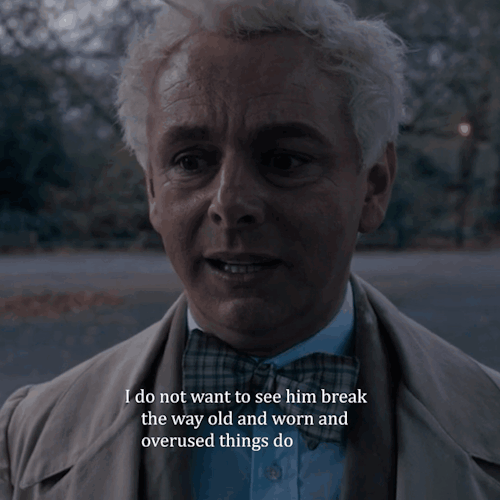
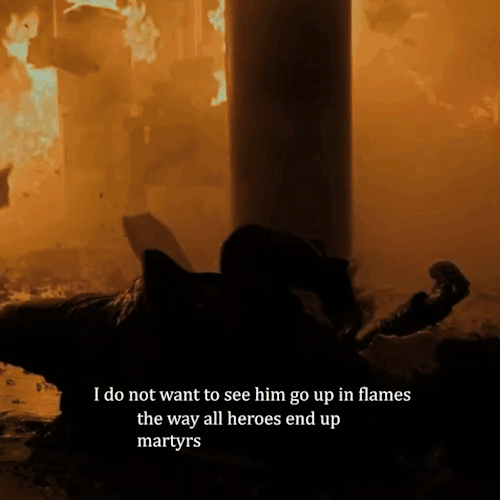

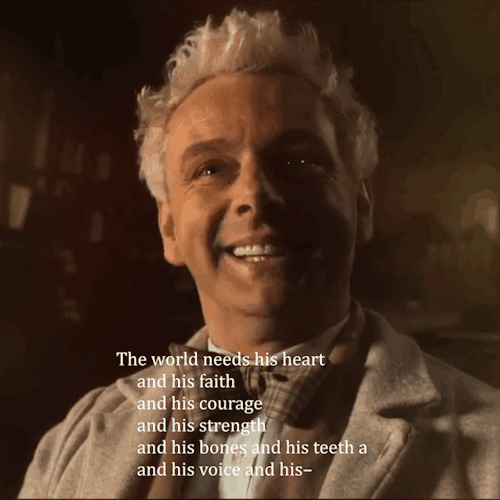

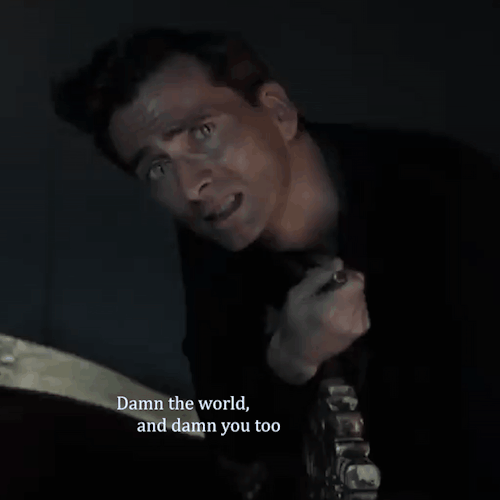
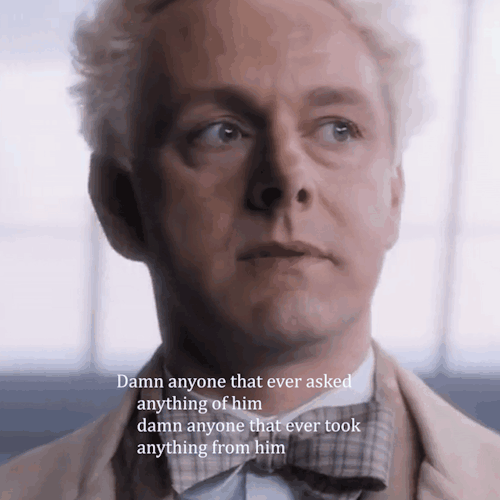

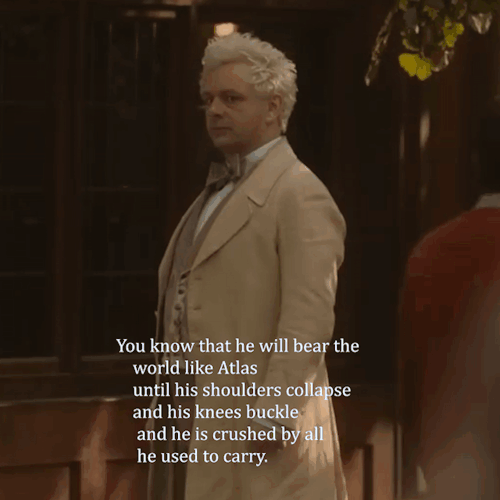
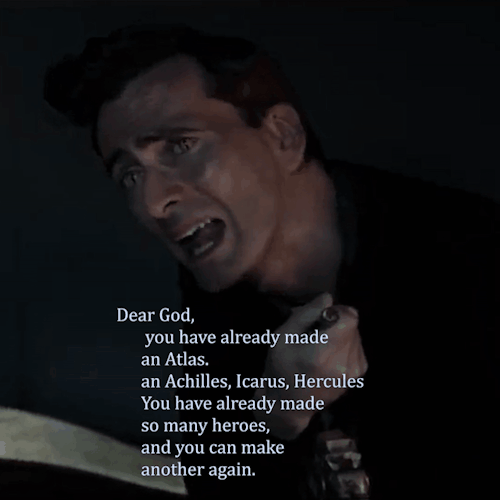



Please, let him be soft. Credit: Pencap
More Posts from Clacomat and Others
1967: you go too fast for me Crowley, or the year the Wolfenden report actually came into effect.


It is no secret that in 1957 the Wolfenden Committee recommended the decriminalisation of private homosexual activity between consenting adults over the age of 21, but with heavier penalties against homosexual activity in public places.

This is precisely what Anathema thinks of when she comments in the book that her book had been left in the back of the car of 'two consenting cycle repairmen'.

Not only does that inform us as readers that the characters within the book perceive Crowley and Aziraphale as being a couple, especially by the (arguably) cleverest witch in the book, but also that their appearances (physical corporations) do in fact look older than 21 years old. (the age of consent)*
*It would take until the 2000s for the age of consent to be equalised, and for lesbian, gay, bisexual and transgender personnel to be able to serve openly in the armed forces.
But coming back to the term 'consenting' and the significance within the overall plot of Good Omens series-wise is the fact that they chose 1967, precisely 10 years later after the Wolfenden report and the year the Sexual Offences Act was passed (which decriminalised private homosexual acts between men aged over 21 in England and Wales, while at the same time imposing heavier penalties on street offences) as a crucial point in storytelling.


This is the last scene we see of them after the montage; this is precisely the point where Aziraphale makes that big, first move towards Crowley and manifests himself inside of the Bentley to protect him from a burglary that could have ended in disaster. This is Aziraphale stepping outside from his own box and venturing into admitting that yes, he would enjoy Crowley's company as more than just an Arrangement. He would like the picnics, he would like to dine openly with him.

And this comes precisely at a time, a real world setting where even the Archbishop of Canterbury agreed, saying: “There is a sacred realm of privacy ... into which the law, generally speaking, must not intrude" (referring to homosexuality).
Although we know Aziraphale and Crowley are not men, but rather men-shaped beings of the world, there is something to be said about how the 1967 act reflects on Aziraphale's 'heavenly' beliefs and how that can be attributed not only to homosexuality*, but also a realm of privacy where neither Heaven or Hell (religion itself) need to interfere with his affairs.

*we do know, however, how much the book and tv series lean into Aziraphale being 'gay', at least in our human understanding of labels and categorizing even though he is not; "pansy" "nancy boys" "gayer than a treeful of monkeys on nitrous oxide" (this one specifically marking Aziraphale canonically in the book as appearing to be a homosexual) "you've got the wrong shop" among others.

A real life anecdote from the time says: John Carter was 17 at the time and doesn’t have a clear memory of the bill passing; he only realised the significance of the change with hindsight. He came out in the early 70s, after making contact with his university’s gay society, which wouldn’t have existed were it not for decriminalisation. “It meant that people could meet … and freely associate.” That was crucial, he says, because, “if you don’t even have a space where you can go, then people are cruising, they’re cottaging * ... It took many years for people who had been constantly looking over their shoulder, being worried, to develop proper ways of relating to each other. Ways that were not just based on sex or compromise or fear.”
*(No, cottaging is not living in a cottage)
No matter that the law had been passed, there was still a lot of stigma surrounding the word 'homosexual'. It wasn't until the 80s and 90s that it stopped being a crime in Scotland and Ireland; being further stigmatized with the AIDS crisis in the late 80s.
Regardless of the nature of the open confession Aziraphale lays bare to Crowley in 1967, it most definitely can be read as a 'coming out' for him. Perhaps not dealing with sexuality directly, but with religion layered on top of that. It is still too fast despite of the year, in spite of the millennia worked together under false pretenses. But it is an exterior, real life push that reinforces the idea for him to see that- if humans are able to recognize that man could be with man and not call it a crime, why could that same thinking not be applied to an angel and a demon living on Earth?
Aziraphale is doing more than blurting his heart out, he is openly hoping for the time that matches 1967 in its decriminalisation of homosexuality to one that applies for him and Crowley. So the thermos, the "better not" say thank you just yet, is a lingering promise to be there for when it finally happens. One which Crowley accepts with bare, open hands.





not where the storyline ends by foolishlovers (T, 14k, complete)
This Christmas, the only thing keeping Crowley going is the release of his favourite romance author’s latest novel, scheduled to launch on Christmas Eve. Yet his already sour mood takes another turn for the worse when he’s forced to conduct a last-minute job interview just before the holidays. Enter Aziraphale: the applicant who is utterly unqualified for the marketing role at the publishing house. Somehow, however, he manages to break through Crowley's carefully maintained indifference—if only for the duration of their meeting. After all, they're bound to part ways after the interview, never to cross paths again. But amid missed opportunities and holiday chaos, Crowley is about to discover that this Christmas still has a few surprises left in store for him.
Miranda from The Tempest and A Companion to Owls.
I remember some time ago a fan pointed out that this scene was incredibly reminiscent of “Miranda” by John William Waterhouse and added Aziraphale on the rock contrasted with the first painting (1875) However, another version of the same painting exists; featuring a red-hair Miranda, which was painted after in 1916.




The Miranda here is a character from William Shakespeare's The Tempest. She was detained on an island, together with her father, Prospero, for almost twelve years. This happened as a result of having been exiled from Milan by Prospero's power-seeking brother, Antonio.


The scene plays very blatantly with the word “exile” and Aziraphale fearing being cast into Hell (exiled from Heaven) and Crowley’s clear banishment from his position as an angel.


The picture has been painted in cold (red hair) and warm tones (blond), playing very much into the tones we get to see in A Companion to Owls. Aziraphale’s side on the rock, with the more conventional, peaceful look and Crowley’s with the rocks on the background.


A ship slices through the waves, causing a feeling of imminent loss; notice how that is exactly Aziraphale’s placement on the frame.

Unlike the paintings though, in Good Omens we get a view of both sides, of before and after the storm. The color palettes combine as both Aziraphale and Crowley are fitted into the frame.



Concluding with the wonderful shot directly mirroring their color palettes (sunnier on Aziraphale’s side; shadows on Crowley’s) again and reversing the order of the Miranda paintings (not chronologically, as we see red-hair Miranda appear later on, but in terms of placement and coloring).




-
 nornandos-blog liked this · 3 weeks ago
nornandos-blog liked this · 3 weeks ago -
 meabeck reblogged this · 1 month ago
meabeck reblogged this · 1 month ago -
 meabeck liked this · 1 month ago
meabeck liked this · 1 month ago -
 purple-hel reblogged this · 1 month ago
purple-hel reblogged this · 1 month ago -
 yes-good-luck-with-that reblogged this · 4 months ago
yes-good-luck-with-that reblogged this · 4 months ago -
 sevanholmes liked this · 5 months ago
sevanholmes liked this · 5 months ago -
 mahlikes reblogged this · 5 months ago
mahlikes reblogged this · 5 months ago -
 alphashley14 liked this · 5 months ago
alphashley14 liked this · 5 months ago -
 perladelarosa007 reblogged this · 5 months ago
perladelarosa007 reblogged this · 5 months ago -
 perladelarosa007 liked this · 5 months ago
perladelarosa007 liked this · 5 months ago -
 2xlee liked this · 6 months ago
2xlee liked this · 6 months ago -
 josafinalopez24 liked this · 6 months ago
josafinalopez24 liked this · 6 months ago -
 fleecy-fawkes91 reblogged this · 6 months ago
fleecy-fawkes91 reblogged this · 6 months ago -
 tsubame17 liked this · 6 months ago
tsubame17 liked this · 6 months ago -
 hannibard reblogged this · 6 months ago
hannibard reblogged this · 6 months ago -
 crispyliza liked this · 6 months ago
crispyliza liked this · 6 months ago -
 jezunya reblogged this · 7 months ago
jezunya reblogged this · 7 months ago -
 juu-ou liked this · 7 months ago
juu-ou liked this · 7 months ago -
 the-brucest-fan liked this · 7 months ago
the-brucest-fan liked this · 7 months ago -
 thebirdnotthepirate liked this · 7 months ago
thebirdnotthepirate liked this · 7 months ago -
 puffmunch-queen liked this · 7 months ago
puffmunch-queen liked this · 7 months ago -
 kyouya-mon-ami reblogged this · 7 months ago
kyouya-mon-ami reblogged this · 7 months ago -
 kyouya-mon-ami liked this · 7 months ago
kyouya-mon-ami liked this · 7 months ago -
 h0neymoss liked this · 7 months ago
h0neymoss liked this · 7 months ago -
 taghreednowar1 liked this · 7 months ago
taghreednowar1 liked this · 7 months ago -
 hellishflames reblogged this · 7 months ago
hellishflames reblogged this · 7 months ago -
 wafflesandd1ck reblogged this · 7 months ago
wafflesandd1ck reblogged this · 7 months ago -
 skaillar liked this · 7 months ago
skaillar liked this · 7 months ago -
 ant-nikki liked this · 8 months ago
ant-nikki liked this · 8 months ago -
 kjgfdsgh877 liked this · 8 months ago
kjgfdsgh877 liked this · 8 months ago -
 buggre-alle-this-bible-1651 liked this · 8 months ago
buggre-alle-this-bible-1651 liked this · 8 months ago -
 crowleyssunshine liked this · 8 months ago
crowleyssunshine liked this · 8 months ago -
 calista-artist liked this · 8 months ago
calista-artist liked this · 8 months ago -
 thenerdrant reblogged this · 8 months ago
thenerdrant reblogged this · 8 months ago -
 janeeeeeeel liked this · 8 months ago
janeeeeeeel liked this · 8 months ago -
 iliketowritebutiminsanelystupid reblogged this · 9 months ago
iliketowritebutiminsanelystupid reblogged this · 9 months ago -
 iliketowritebutiminsanelystupid liked this · 9 months ago
iliketowritebutiminsanelystupid liked this · 9 months ago -
 a1sart reblogged this · 9 months ago
a1sart reblogged this · 9 months ago -
 a1sart liked this · 9 months ago
a1sart liked this · 9 months ago -
 snowie26-blog liked this · 9 months ago
snowie26-blog liked this · 9 months ago -
 thisiswasabis liked this · 9 months ago
thisiswasabis liked this · 9 months ago -
 kingscythe reblogged this · 9 months ago
kingscythe reblogged this · 9 months ago -
 kingscythe liked this · 9 months ago
kingscythe liked this · 9 months ago -
 gryssenielsen reblogged this · 9 months ago
gryssenielsen reblogged this · 9 months ago -
 purplehazepaladin reblogged this · 9 months ago
purplehazepaladin reblogged this · 9 months ago -
 purplehazepaladin liked this · 9 months ago
purplehazepaladin liked this · 9 months ago

Clacomat, she/hermassive Good Omens fan
153 posts














